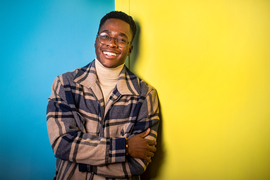Growing up in Lagos, Nigeria, Ayomikun Ayodeji enjoyed the noisy hustle and bustle of his neighborhood. The cacophony included everything from vendors hawking water sachets and mini sausages, to commuters shouting for the next bus.
Another common sound was the cry of “Up NEPA!” — an acronym for the Nigerian Electrical Power Authority — which Ayodeji would chant in unison with other neighborhood children when power had been restored after an outage. He remembers these moments fondly because, despite the difficulties of the frequent outages, the call also meant that people finally did have long-awaited electricity in their homes.
“I grew up without reliable electricity, so power is something I’ve always been interested in,” says Ayodeji, who is now a senior studying chemical engineering. He hopes to use the knowledge he has gained during his time at MIT to expand energy access in his home country and elsewhere in Africa.
Before coming to MIT, Ayodeji spent two years in Italy at United World College, where he embarked on chemistry projects, specifically focusing on dye-sensitized solar cells. He then transferred to the Institute, seeking a more technical grounding. He hoped that the knowledge gained in and out of the classroom would equip him with the tools to help combat the energy crisis in Lagos.
“The questions that remained in the back of my mind were: How can I give back to the community I came from? How can I use the resources around me to help others?” he says.
This community-oriented mindset led Ayodeji to team up with a group of friends and brainstorm ideas for how they could help communities close to them. They eventually partnered with the Northeast Children’s Trust (NECT), an organization that helps children affected by the extremist group Boko Haram. Ayodeji and his friends looked at how to expand NECT’s educational program, and decided to build an offline, portable classroom server with a repository of books, animations, and activities for students at the primary and secondary education levels. The project was sponsored by Davis Projects for Peace and MIT’s PKG Center.
Because of travel restrictions, Ayodeji was the only member of his team able to fly to Nigeria in the summer of 2019 to facilitate installing the servers. He says he wished his team could have been there, but he appreciated the opportunity to speak with the children directly, inspired by their excitement to learn and grow. The experience reaffirmed Ayodeji’s desire to pursue social impact projects, especially in Nigeria.
“We knew we hadn’t just taken a step in providing the kids with a well-rounded education, but we also supported the center, NECT, in raising the next generation of future leaders that would guide that region to a sustainable, peaceful future,” he says.
Ayodeji has also sought out energy-related opportunities on campus, pursuing an undergraduate research program (UROP) in the Buonassisi Lab in his sophomore year. He was tasked with testing perovskite solar cells, which have the potential to reach high efficiencies at low production costs. He characterized the cells using X-ray diffraction, studying their stability and degradation pathways. While Ayodeji enjoyed his first experience doing hands-on energy research, he found he was more curious about how energy technologies were implemented to reach various communities. “I wanted to see how things were being done in the industry,” he says.
In the summer after his sophomore year, Ayodeji interned with Pioneer Natural Resources, an independent oil and gas company in Texas. Ayodeji worked as part of the completions projects team to assess the impact of design changes on cluster efficiency, that is, how evenly fluid is distributed along the wellbore. By using fiberoptic and photographic data to analyze perforation erosion, he discovered ways to lower costs while maintaining environmental stability during completions. The experience taught Ayodeji about the corporate side of the energy industry and enabled him to observe how approaches to alternative energy sources differ across countries, especially in the U.S. and Nigeria.
“Some developing economies don’t have the capacity to pour resources into expanding renewable energy infrastructure at the rate that most developed economies do. While it is important to think sustainably for the long run, it is also important for us to understand that a clean energy transition is not something that can be done overnight,” he says.
Ayodeji also employs his community-oriented mindset on campus. He is currently the vice president of the African Students’ Association (ASA), where he formerly chaired the African Learning Circle, a weekly discussion panel spotlighting key development and innovation events taking place on the African continent. He is also involved with student outreach, both within the ASA and as an international orientation student coordinator for the International Students Office.
As a member of Cru, a Christian community on campus, Ayodeji helps lead a bible study and says the group supports him as he navigates college life. “It is a wonderful community of people I explore faith with and truly lean on when things get tough,” he says.
After graduating, Ayodeji plans to start work at Boston Consulting Group, where he interned last summer. He expects he’ll have opportunities to engage with private equity issues and tackle energy-related cases while learning more about where the industry is headed.
His long-term goal is to help expand renewable energy access and production across the African continent.
“A key element of what the world needs to develop and grow is access to reliable energy. I hope to keep expanding my problem-solving toolkit so that, one day, it can be useful in electrifying communities back home,” he says.











